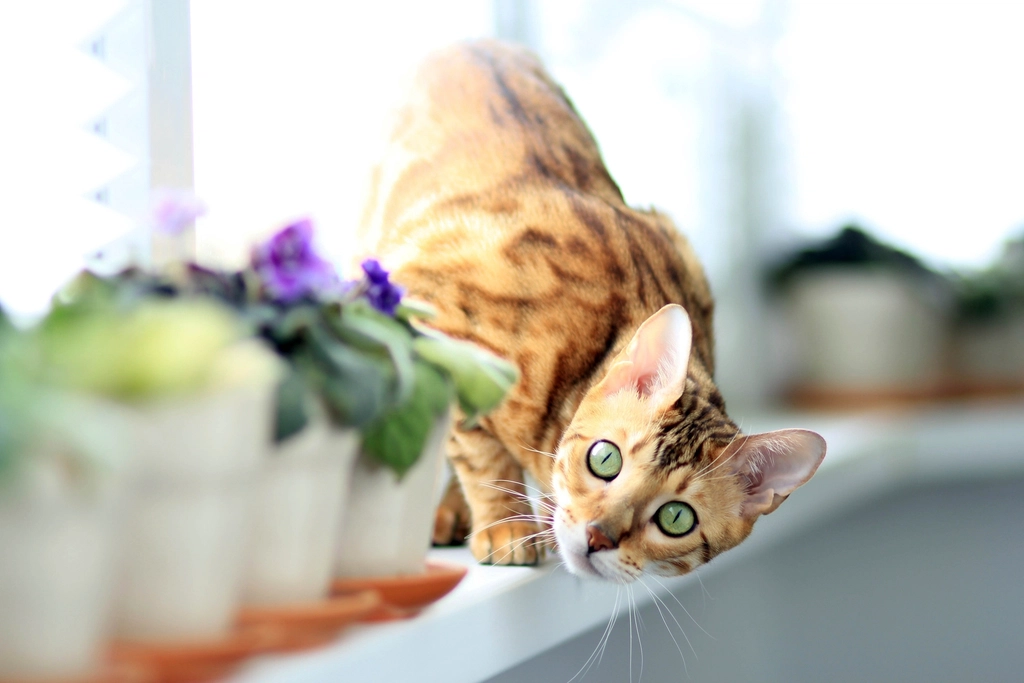Have you ever wondered what it’s like to share your life with a creature that seems to have a spark of wild magic in its eyes? Bringing an Abyssinian cat into your home isn’t just adopting a pet—it’s inviting an energetic, clever, and endlessly curious companion into your everyday world. These cats are not for the faint of heart, nor for those who cherish a quiet, undisturbed routine. Living with an Abyssinian is an adventure that can surprise you, delight you, and even test your limits in the most unexpected ways. Whether you’re a seasoned cat lover or just dreaming of adopting your first feline friend, get ready to uncover the true reality—quirks, chaos, and all—of life with an Abyssinian cat.
The Unmistakable First Impression

When an Abyssinian cat first enters your home, you’ll likely be captivated by their striking appearance. Their ticked, golden coats shimmer under the light, and their large, almond-shaped eyes seem to see right through you. But don’t be fooled by their regal look—within minutes, they’ll be exploring every corner, shelf, and crevice. They don’t hesitate to investigate your belongings or make themselves at home on your favorite chair. It’s like hosting a tiny, furry explorer who believes they own the place. Many new owners find themselves both charmed and bewildered by how quickly an Abyssinian sets the tone in the household.
Abyssinians and Their Relentless Curiosity

Abyssinians are well-known for their boundless curiosity. Nothing is off-limits to them. If you’ve left a cupboard slightly ajar, you’ll soon find a curious nose poking inside. They love to investigate everything, from your grocery bags to the contents of your closet. Their need to know what’s going on at all times can be both hilarious and exasperating. If you value your privacy, prepare for it to be a thing of the past. Living with an Abyssinian means you’ll never be alone—not even in the bathroom.
Nonstop Energy and Playfulness

If you picture cats as lazy creatures lounging in the sun, an Abyssinian will quickly shatter that image. These cats are the athletes of the feline world. They love to run, jump, and climb—sometimes all at once. Toys are essential, but even with a mountain of them, your Abyssinian will invent new games using whatever is at hand. Don’t be surprised if you catch them leaping onto bookshelves or darting across the room at lightning speed. Their playfulness is infectious, pulling even the most reluctant humans into their antics.
The Art of Climbing (and Conquering Heights)

Abyssinians are natural-born climbers. Bookshelves, cabinets, and even the tops of doors become their personal playgrounds. They seem to defy gravity, perching in places you never thought a cat could reach. This love of heights isn’t just for fun—it’s an instinctive behavior. In the wild, cats climb to survey their territory, and Abyssinians have kept that trait alive. If you live with one, you quickly learn to cat-proof your high spaces and accept that no nook is truly out of bounds.
Endearing Social Butterflies

Unlike some aloof cat breeds, Abyssinians thrive on interaction. They want to be where the action is, whether that’s curled up next to you on the sofa or following you from room to room. They’re the ultimate social butterflies, often greeting guests at the door and demanding to be part of every conversation. Their affectionate nature means you’ll rarely feel lonely. Some Abyssinians even display dog-like loyalty, waiting by the window for you to return home. Their companionship can be deeply comforting, especially on tough days.
Vocal Communication: More Than Just Meows

Abyssinians are not typically known for loud, incessant meowing, but they do have a lot to say. Their voices are soft yet expressive, and they communicate through trills, chirps, and purrs. Each sound has its own meaning, and you’ll soon learn to distinguish a “feed me now” chirp from a “let’s play” trill. They’re masters at using their voices to get your attention or express their mood. Some owners say having an Abyssinian is like living with a chatty toddler who never quite grows up.
Grooming the Gorgeous Ticked Coat

One of the most beautiful features of the Abyssinian is their striking ticked coat. Thankfully, their short fur doesn’t require much grooming compared to long-haired breeds. A weekly brushing is usually enough to keep shedding under control and maintain their glossy appearance. However, Abyssinians enjoy the attention, so grooming sessions often turn into bonding moments. You may find your cat nudging you for more, especially if you use a soft brush. Their love for cleanliness means they’ll often take care of the rest themselves.
Intelligence That Surprises You Daily

Abyssinians are among the most intelligent cat breeds. They learn quickly and seem to understand routines, commands, and even some words. Puzzle toys, interactive feeders, and training sessions help keep their sharp minds engaged. Don’t be surprised if your Abyssinian figures out how to open doors or solve problems you didn’t even know existed. Their cleverness can sometimes get them into trouble, but it also makes living with them endlessly entertaining. You may catch yourself wondering who is training whom.
Abyssinians and Other Pets

These cats generally get along well with other animals, thanks to their playful and social nature. They often form close bonds with other cats and even dogs, especially if introduced properly. However, their dominant personalities mean they like to be in charge. If you have other pets, expect some playful power struggles and games of chase. Over time, Abyssinians usually become the ringleaders of the household, encouraging everyone to join in their fun.
Feeding Habits and Dietary Needs

Abyssinians are active cats, so they need a diet that supports their high energy levels. High-quality, protein-rich food is a must. They can be a bit picky about what they eat, and you might notice them turning up their noses at certain flavors. Because of their athleticism, portion control is important to prevent overeating. Some owners find that feeding small, frequent meals works best. Keep treats on hand for training and bonding, but don’t overdo it—Abyssinians are clever enough to beg convincingly.
Health Considerations and Vet Visits

While generally healthy, Abyssinians can be prone to certain genetic conditions, such as kidney issues and dental disease. Regular vet checkups are vital to catch any problems early. Vaccinations, dental care, and routine blood work should be part of your cat’s healthcare plan. Because they’re so active, they tend to maintain a healthy weight, but it’s important to watch for any changes in appetite or behavior. Early detection can make all the difference in their long-term well-being.
Creating a Stimulating Environment

An Abyssinian’s need for mental and physical stimulation can’t be overstated. Boredom can quickly lead to destructive behavior or mischief. Cat trees, shelves, window perches, and a rotation of toys help keep their minds busy. Puzzle feeders and interactive games are also excellent choices. If you work long hours, consider setting up a window perch so they can watch birds and squirrels outside. A stimulated Abyssinian is a happy Abyssinian, and providing enrichment is key to harmony in your home.
Traveling With an Abyssinian

Some Abyssinians adapt surprisingly well to travel, especially if introduced to carriers and car rides from a young age. Their curiosity can make them more open to new experiences compared to other breeds. However, every cat is unique, and some may prefer to stay home. If you do travel with your Abyssinian, bring familiar items like toys or blankets to comfort them. Short practice trips can help ease anxiety. Safety is paramount, so always use a secure carrier and never let your cat roam freely in the car.
Training and Teaching New Tricks

Many people are amazed at how trainable Abyssinians can be. With patience and positive reinforcement, you can teach them to come when called, sit, or even fetch. Clicker training works well, as these cats quickly associate sounds with rewards. Training sessions should be short and fun, never forced. The trick is to keep things interesting—Abyssinians get bored easily and will tune out if they’re not engaged. Teaching tricks isn’t just about showing off; it’s a wonderful way to bond and stimulate their agile minds.
Handling Mischievous Behavior

With intelligence often comes mischief, and Abyssinians are no exception. They might “help” you with household chores, knock items off tables, or unravel rolls of toilet paper. They’re not being naughty on purpose—they’re just exploring and entertaining themselves. Redirecting their energy with toys and playtime works better than scolding. Setting boundaries with gentle consistency is important, but so is learning to laugh at their antics. Living with an Abyssinian teaches you patience—and gives you plenty of funny stories to share.
Affectionate Moments and Lap Time

Although Abyssinians are active, they also have a tender side. They often seek out cuddles and enjoy curling up next to their favorite person. Unlike some lap cats, they may not stay still for long, but their affection is genuine. Head butts, slow blinks, and gentle purring are their ways of saying “I love you.” These moments of closeness are precious, especially after a whirlwind of play. If you listen carefully, you’ll notice the deep, rumbling purrs that signal pure contentment.
The Joy of Watching Them Grow

Raising an Abyssinian from kittenhood is a whirlwind of growth and discovery. They change quickly, both physically and in personality. Every day brings new surprises as they learn about their world—and teach you a bit about yours. Watching them conquer new challenges, explore new spaces, and develop their unique quirks is endlessly rewarding. Many owners say their bond with their Abyssinian deepens with each passing year. The journey from playful kitten to wise adult is nothing short of magical.
Living With Their Quirks

Every Abyssinian has its own set of quirks. Some love water and will play in the sink, while others are obsessed with chasing shadows. You might find your cat hoarding socks or developing a fascination with certain TV shows. These quirks are part of what makes each Abyssinian special. Embracing their individuality—and sometimes their odd habits—adds color and humor to daily life. If you’re willing to celebrate their eccentricities, you’ll be rewarded with a truly unique companion.
Children and Abyssinians: A Dynamic Duo

Abyssinians often do well in homes with children, thanks to their playful, interactive nature. They enjoy games of chase, feather toys, and even hide-and-seek. Teaching children how to handle and respect a pet is important, as Abyssinians can get overwhelmed by rough play. With proper supervision, strong bonds often form between kids and cats. The laughter and joy that result from their adventures together create memories that last a lifetime.
Daily Life: Challenges and Rewards

Living with an Abyssinian is a daily blend of excitement and challenge. Their energy can be overwhelming at times, especially if you’re used to a quieter household. You might find your routines disrupted by a curious paw or a sudden burst of running. Yet the rewards are immense—constant companionship, laughter, and unconditional love. They remind you to stay curious, to play, and to find joy in everyday moments. Sharing your home with an Abyssinian means never having a dull day.
Abyssinians: The Heart of the Home

Over time, your Abyssinian will become the heart of your household. Their presence is felt in every room, in every daily ritual. They leave their mark not just on your furniture, but on your heart. Their loyalty, affection, and zest for life transform an ordinary house into a warm, lively home. Living with an Abyssinian is an experience that changes you, teaching you patience, compassion, and the true meaning of companionship. Whether you’re a lifelong cat lover or a first-time owner, the journey is unforgettable.

Growing up traveling and experiencing new cultures and wonders, I have had a passion for nature, adventuring, photography, and videography. I am currently working towards a BSc in Biodiversity and Ecology at Stellenbosch University, and I hope to specialise in Marine Sciences one day.
Please send any feedback to Feedback@animalsaroundtheglobe.com






